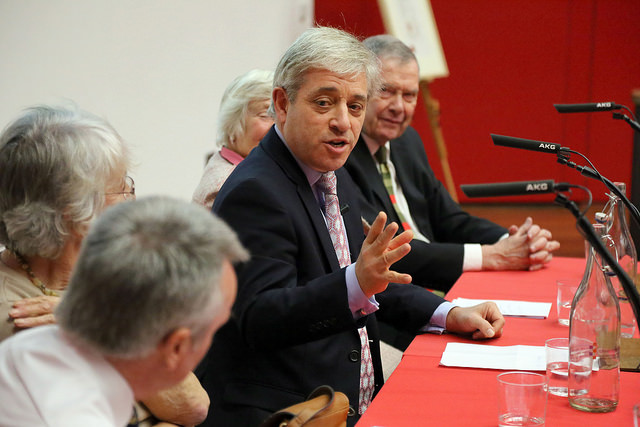Digital technology can help create the broader cultural change needed to address limitations in our current democratic system
The Speaker’s Commission on Digital Democracy was set up by John Bercow this year to assess ways in which democracy could benefit from digital solution. Ali Stoddart, in a recent talk at a Commission event, argued that digital democracy is a possibility, and that it can help to create a context in which the wider cultural change needed to address to reinvigorate Britain’s ailing democracy can take hold.

Credit: University of Essex, CC BY 2.0
Back in September I was asked by the Speaker’s Commission on Digital Democracy to speak in Sheffield at anevent co-hosted by the Commission and Sheffield University’s Digital Society Network. You can see a Storify of the event here.
I was speaking on a rather large panel with: Helen Milner, Digital Democracy Commissioner; Natalie Bennett, Green Party Leader; Yael Shafritz, President of Sheffield Student Union; Nick Ellison, Professor of Social Policy, University of York; and Charles Pattie, Professor of Geography, University of Sheffield. We were discussing how Digital Tools could help find new ways of reconnecting parliament & citizens.
The Commission recently published my rough notes from the event on the Parliament Website. It appears below:
There is a lot of talk about the opportunities provided by digital tools to reconnect the public to the political process due to attributes of interactivity, affordability and connectivity The lead thinker on this subject, Manuel Castells, talks about digital technology helping to create the “Network Society” by providing “a horizontal, non-controlled, relatively cheap channel of communications which brings people into contact with the public agora, to voice their concerns and share their hopes.”
But at the same time, others are constantly bringing up problems such as: the digital divide, featuring the digital haves and have nots; echo-chambers, which cause polarisation and fragmentation of online discussion; and normalisation of offline themes, such as the “usual suspects” who always engage offline and will continue to engage online, to the possible detriment of the less engaged, who are not heard. These problems could make digital tools struggle to live up to their democratic capacity.
These are all arguments of either digital optimists or cyber cynics. I would say that I do not fall into either of those categories. I would say that I am a digital democracy potentialist: someone who believes in the potential of digital tools to do great things for our democracy. But, I know that it is not the tool itself that makes the difference; and it is not just how you use the tool. It is also the surrounding culture our digital technologies are embedded within that must change in order to revitalise our democracy.
Social media is one example of a digital tool that could engage the public with political issues, and politicians have spoken at length about Facebook and Twitter “connecting with the next generation of voters” “inviting people in” and having “dialogue.” There is no doubt that social media has the potential to do all of these things, but again, it all depends on how these tools are used within the surrounding political culture.
As we sit here in Sheffield, near the constituency of the Deputy Prime Minister, I thought I would take the opportunity to highlight different ways Nick Clegg has used Social media throughout his time as leader of the Liberal Democrats.
During Nick’s early experimentation with Facebook in 2008-2009 he used it to connect with the public, answer questions and canvass opinion to help shape party policy using videos, written comments and notes (Does anyone remember Facebook notes?). These showed him encouraging transparency by requesting the public “ask any question” and he displayed a willingness to engage in “constructive debate” with the public.
However, once he gained power his Social Media strategy reverted to the top-down, press release based, one way, broadcast nature that is seen all too often on other representatives social media feeds.
Why would this happen?
I fe el it may have something to do with power. It seems it is a lot easier to use digital tools to have dialogue with the public when you are the leader of the third political party, than it is when you are Deputy Prime Minister and hold real power. Then it is all of a sudden a lot more difficult to give power away.
el it may have something to do with power. It seems it is a lot easier to use digital tools to have dialogue with the public when you are the leader of the third political party, than it is when you are Deputy Prime Minister and hold real power. Then it is all of a sudden a lot more difficult to give power away.
So perhaps the real cultural change that must happen in relation to digital technology and democracy is having the ability to genuinely give power away and work with citizens to create new laws and policies from the beginning of the process, out in the open, in an iterative manner.
Participative Democracy does not take away the need for Parliamentary representatives. Rather, genuinely engaging and working with the public makes for better representatives.
Now, this all can’t happen on social media but I feel that social media should be used as an alternative communication channel (to add to traditional ones) that makes the initial connection with citizens and then allows citizens to move beyond this towards new spaces, some of them digital, where policy can be deliberated from start to finish, over time; not consulted on at the last minute with no opportunity to change; and with feedback that shows citizens that their engagement is worth while and actually makes a difference. Digital has the potential to help us achieve this.
In order for this change to happen, parliament, government and representatives need to experiment with different ways of using digital. Social entrepreneurs need to become more collaborative – “there is not a one tool fits all” solution. Furthermore, an overhaul of our democratic digital engagement process needs to continue in the same vein as this commission: in the open, and involving the public all the way through.
Finally I want to make a point about some evidence given to the committee previously about the “public not caring enough to engage” and having “no appetite to be more involved”, which at the time I disagreed with, as in reality the public does care about issues and services and policies that effect their lives. However, citizens cannot abide the current closed political culture that we find ourselves embedded within. This may be because citizens do not have any real opportunity to engage, co-create and deliberate in a genuine and meaningful way.
The Scottish Independence Referendum has given an empirical example of public appetite for involvement and this has started a huge conversation through out the UK.
Digital technology can be the stimulus that makes us consider the broader cultural change needed to address limitations in our current democratic system. Technology itself is not a silver bullet and it will not effectively correct poor existing practices. It is not a cause and effect between digital and better democracy; it is an interrelationship between technology, practices and culture.
Hopefully, we can continue to experiment with digital tools but also change our political culture, to create informed, dynamic interactions between the public and their representatives that supports the development of new laws & policies that the public have made a difference to; and have been part of.”
—
Note: this post originally appeared on the Democratic Society’s blog. It represents the views of the author, and not those of Democratic Audit or the LSE. Please read our comments policy before posting.
—
 Ali Stoddart has a Masters Degree in International Communications from the University of Leeds, and has studied at the University of Glasgow. He is soon to take up work at the Democratic Society.
Ali Stoddart has a Masters Degree in International Communications from the University of Leeds, and has studied at the University of Glasgow. He is soon to take up work at the Democratic Society.





 Democratic Audit's core funding is provided by the Joseph Rowntree Charitable Trust. Additional funding is provided by the London School of Economics.
Democratic Audit's core funding is provided by the Joseph Rowntree Charitable Trust. Additional funding is provided by the London School of Economics.
Our @AliStoddart1’s recent blog on Digital Democracy Potentialism has been published by @democraticaudit: https://t.co/mXn8Kz9BiD
My recent blog on Digital Democracy Potentialism has been published by @democraticaudit: https://t.co/QLfMVnfUku cc @digidemocracyuk
Digital can help create the broader cultural change needed to address limitations in our current democratic system https://t.co/g6TXyH46v0
Digital technology can help create the broader cultural change needed to address limitations in our democratic system https://t.co/kgVl1Qt6RU
Digital technology can help create the broader cultural change needed to address limitations in our current demo… https://t.co/D2egLfTg41
Digital technology can help create broader cultural change to address limitations in our current democratic system https://t.co/8c3JItlykS
Digital technology can help create the broader cultural change needed to address limitations in our current… https://t.co/nohw1bRmPX